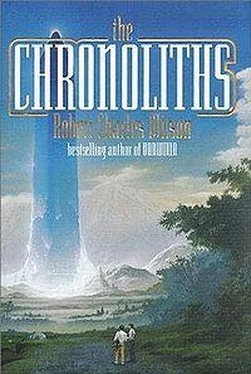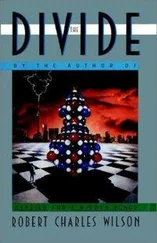The secret was inevitably some paranoid assertion: that cats could read her mind; that my father was an impostor; that the government was trying to poison her.
“Come on, Scotty,” Sue said, “don’t look at me like that.”
“If you tell me,” I said, “it’s not a secret anymore.”
“Well, that’s true. But I have to tell someone. I can’t tell Ray, because Ray is in love with me. And I can’t tell Hitch, because Hitch doesn’t love anyone at all.”
“That’s cryptic.”
“Yes. I can’t help it.” She glanced at the far blue pillar of the Kuin. “We may not have much time.”
“Time for what?”
“I mean, it won’t last. The Chronolith. It isn’t stable. It’s too massive. Look at it, Scotty. See the way it’s sort of quivering?”
“That’s heat coming off the prairie. It’s an optical illusion.”
“In part. Not entirely. I’ve run the numbers over and over. The numbers that pegged back at the bunker. These numbers.” Her notebook. “I triangulated its height and its radius, at least roughly. And no matter how stingy I am with the estimates, it comes up past the limit.”
“The limit?”
“Remember? If a Chronolith is too massive, it’s unstable — if I could have published the work they might have called it the Chopra Limit.” Her peculiar smile faded and she looked away. “I may be too vain for the work I have to do. I can’t let that happen. I have to be humble, Scotty. Because I will, God knows, be humbled .”
“You’re saying you think the Chronolith will destroy itself.”
“Yes. Within the day.”
“That would hardly be a secret.”
“No, of course, but the cause of it will be. The Chopra Limit is my work. I haven’t shared it with anyone, and I doubt anyone else is doing triangulation. The Kuin won’t last long enough for accurate measurement.”
This was making me nervous. “Sue, even if this is all true, people will know—”
“Know what ? All anyone will know is that the Chronolith was destroyed and that we were here trying to destroy it. They’ll draw the obvious conclusion. That we succeeded, if a little belatedly. The truth will be our secret.”
“Why a secret?”
“Because I mustn’t tell, Scotty, and neither must you. We have to carry this secret at least twenty years and three months into the future or else it won’t work.”
“Dammit, Sue — what won’t work?”
She blinked. “Poor Scotty. You’re confused. Let me explain.”
I couldn’t follow every detail of her explanation, but this is what I came away with.
We had not been defeated.
Plenty of press folks were doubtless still reporting the arrival, and they would also witness — in a matter of hours if not minutes — the spectacular collapse of the Chronolith. That broadcast image would (Sue claimed) interrupt the feedback loop and shatter Kuin’s aura of invincibility. Win or lose, Kuin would no longer be destiny. He would be reduced to the status of an enemy.
And the world must think we had succeeded; the Chopra Limit must remain a closely-held secret…
Because, Sue believed, it was not a coincidence that this Chronolith had surpassed the physical limit of stability.
It was, she declared, quite obviously an act of sabotage.
Contemplate that: the sabotage of a Chronolith, by design. Who would commit such an act? Clearly, an insider. Clearly, someone who understood not only the crude physics of the Chronoliths but their finest nuances. Someone who understood the physical limits and knew how to push them.
“That arrow,” Sue said almost sheepishly, shocked at the temerity of her words and not a little frightened: “That arrow is pointing at me .”
Of course it was madness.
It was megalomania, self-aggrandizing and self-abnegating, both at once. Sue had elevated herself to the rank of Shiva. Creator, destroyer.
But a part of me wanted it to be true.
I think I wanted an end to the long and disruptive drama of the Chronoliths — not just for my sake but for Ashlee’s, for Kaitlin’s.
And I wanted to trust Sue. After a lifetime of doubt, I think I needed to trust her.
I needed her madness to be, miraculously, divine.
Hitch was still working on the van when the twelve motorcycles came down the access road in a billow of gray dust. They came from the direction of the Chronolith.
Sue and I scurried back to the shed as soon as we spotted them. By that time Ray had alerted Hitch. Hitch had come out from under the engine block and was loading and passing out our four handguns.
I took one of these gratefully, but just as quickly disliked the way it felt in my hand — cold and faintly greasy. More than the sight of the approaching strangers, who were almost certainly Kuinists but could have been anyone, it was the pistol that made me feel afraid. A weapon is supposed to boost your confidence, but in my case it only served to emphasize how vulnerable we were, how desperately alone.
Ray Mosely tucked his gun under his belt and began frantically thumbing his pocket phone. But we hadn’t been able to get a call out for days and he wasn’t having any better luck now. The attempt seemed almost reflexive and somehow pitiable.
Hitch held out a gun for Sue, but she pressed her hands to her sides. “No, thank you,” she said.
“Don’t be stupid.”
I was able to hear the motorcycle engines now, the sound of locusts, a plague descending.
“Keep it,” she said. “I wouldn’t know what to do with it. I’d probably shoot the wrong person.”
She looked at me when she said this, and I was inexplicably reminded of the young girl in Jerusalem who had thanked Sue just before she died. Her eyes, her voice, had conveyed this same cryptic urgency.
“We don’t have time to argue.”
Hitch had taken charge. He was alert and focused, frowning like a chess player facing a skilled opponent. The concrete-block shed possessed a single door and three narrow windows — an easy space to defend but a potential death trap if we were overwhelmed. But the van wouldn’t have been any safer.
“Maybe they don’t know we’re here,” Ray volunteered. “Maybe they’ll ride on past.”
“Maybe,” Hitch said, “but I wouldn’t count on it.”
Ray put a hand on the butt of his pistol. He looked at the door, at Hitch, at the door, as if trying to work out some perplexing mathematical question.
“Scotty,” Sue said, “I’m depending on you.”
But I didn’t know what she meant.
“They’re slowing down,” Hitch said.
“Maybe they’re not Kuinists,” Ray said.
“Maybe they’re nuns on a day trip. But don’t count on it.”
Their disadvantage was, they had no cover.
The land here was flat and grown over with sage-grass. Clearly aware of their vulnerability, the bikers came to an idling stop a distance from the shed, out of easy range.
Watching through the gap in the cinderblocks that passed as a west-facing window, what struck me was the incongruity of all this. The day was fine and cool, the sky as cloudless as crystal. Even the perhaps unstable Chronolith seemed fixed and placid on the horizon. The small sound of sparrows and crickets hung in the air. And yet here were a dozen armed men straddling the road and no help for many miles.
One of the bikers put his helmet in his hand, shook out a flourish of dirty blond hair, and began walking almost lazily down the dirt track toward us.
And:
“I’ll be flicked,” Hitch said, “if that isn’t Adam Mills.”
We were deep in the tau turbulence, I guess Sue might have said; in that place where the arrow of time turns on itself and turns again, that place where there are no coincidences.
Читать дальше












